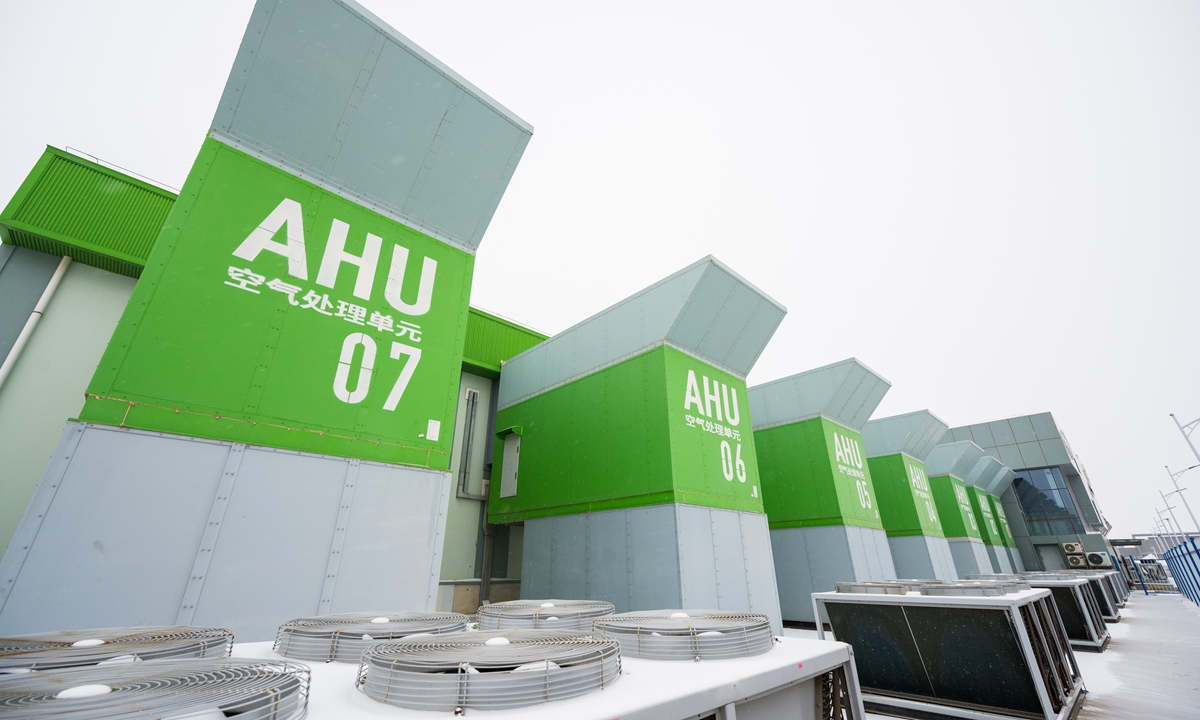
Cloud infrastructure at the Western Cloud Base in Zhongwei, Northwest China's Ningxia Hui Autonomous Region, on December 10, 2024 Photo: Chen Tao/GT
Editor's Note:
As the global economy, including China's, faces challenges, Western politicians and media outlets have stepped up their attacks against the world's second-largest economy. They selectively highlight information and distort facts to promote narratives including "Peak China," while ignoring China's economic resilience and growth potential. To set the record straight, the Global Times is launching a multimedia project featuring in-depth articles, analyses and info-graphics to provide a balanced and accurate portrayal of the Chinese economy. This is the 20th installment of the series.
In the thriving industrial park in Zhongwei city, Northwest China's Ningxia Hui Autonomous Region, a data hub is being built by China Communications Construction Group (CCCC).
Zhongwei, used to be known for its Gobi Desert and warren mountains, is leveraging its strength in data storing and processing, and now positioning itself as a key player in the increasingly important data industry.
During a recent trip to Northwest China, Global Times reporters visited cloud computing bases in Zhongwei and talked to several industry players who noted the increasing integration of digital technology into various aspects of economic and social development in China, driving the evolution of new quality productive forces.
"The total investment of the data center being constructed is 3.8 billion yuan ($520.5 million), which will serve as a central hub for big data, providing operational data service and intelligent computing results to meet the growing national demand for computing power and digital solutions," Hu Ming, deputy general manager of CCCC (Zhongwei) Big Data Technology Co, told the Global Times.
Digital solutions
There has been a notable increase in the construction of all types of data centers in the city. Local government officials noted that there were more than a dozen big data projects initiated in Zhongwei in 2024, at an estimated investment of 14 billion yuan.
To date, 16 large and ultra-large data centers have been set up in Zhongwei, attracting more than 200 cloud computing and internet-based enterprises including Amazon and Meili Cloud. The centers provide data storage and cloud computing services to over 4,000 companies and institutions, which have created over 5,700 local jobs, Ma said.
China's major telecom operators, including China Mobile, China Telecom, and China Unicom, have also established data centers in Zhongwei.
For example, China Unicom was among the first companies to establish and operate a data center in Zhongwei. Currently, China Unicom has completed the construction of three data center buildings, delivered over 8,800 standard racks, and deployed more than 14,000 graphic processing unit (GPU) chips.
"Such efforts signify a major transformation from a conventional data center to a modern computing hub, providing high-quality data services for the government, top internet platform companies and other enterprises," said Yin Xiaohui, the China Unicom Zhongwei data center's deputy manager.
"Computing power is expected to play a crucial role in the growth of China's digital economy, supporting the country's data processing ability and AI innovation," Ma Zhenjun, deputy director of Zhongwei Cloud Computing and Big Data Development Bureau, told the Global Times.
The data industry of the city is in line with the government's strategic development plan.
In February 2022, China launched the "east data, west computing" project -- a mega project to establish eight national computing hubs and 10 national data center clusters to channel more computing resources from the country's eastern regions to the vast western provinces.
China's computing power industry has maintained an average annual growth rate of about 30 percent over the past five years, a white paper from the China Academy of Information and Communications Technology (CAICT) showed.
Zhongwei has edge in developing big data and cloud computing sectors, local officials noted. "We own abundant and reliable electricity resources, an average yearly temperature of 8.8 degrees Celsius, and stable geological structure," Ma said.
Distinct advantages
This is echoed by Yan Xiaoping, deputy manager of Ningxia Western Cloud Data Technology Co. He told the Global Times that Zhongwei boasts abundant new energy sources such as wind and solar power, as well as a dry and cold climate. Therefore, the energy cost of data centers in Zhongwei is at the lowest level nationwide.
Leveraging these advantages, Yan's company has deployed nearly 3,000 proprietary servers and built an intelligent computing cloud platform at the Western Cloud Base in Zhongwei.
This platform is specifically tailored to support a diverse array of applications, with a particular focus on artificial intelligence (AI) models training, both of which require significant data reserve and computing power, said Yan.
Amid the accelerating development of the digital economy in China, Yan's company sees significant growth potential and aims to drive Ningxia's digital transformation.
China's cloud computing market size has expanded to 616.5 billion yuan in 2023, representing a growth rate of 35.5 percent. The sector is anticipated to see continued rapid growth with the ongoing development of 5G, cloud and AI technologies, according to CAICT.
Now, Zhongwei city has set its eyes on becoming a national-level advanced data hub and a key cloud computing center.
In 2023, the city's digital information industry output reached 10 billion yuan, up by 30 percent over a year earlier, according to the 2024 Government Report released by the Zhongwei municipal government.
Cloud computing is essentially a premium computing method in the field of computer technology, representing vast storage, processing and computing capability, Ma said, adding that cloud computing should become as easily accessible as electricity and evolve into a widely available public service.
As computing power serves as the core driver of productivity in the digital economy, it's crucial to prioritize the development of new and high quality infrastructure, including data centers and networking hardware, Ma said.
Data from the National Data Administration showed that China's digital infrastructure has significantly advanced, with the scale of computing power reaching 230 EFLOPS in 2023, ranking second in the world.
China will strive to achieve an average compound annual growth of 15 percent in its data industry by 2029, according to guidelines released by the National Development and Reform Commission and five other departments. By 2029, the structure of the data industry will be greatly optimized, data tech innovation will reach a globally competitive level, backed up by a good number of internationally competitive data companies, the guidelines said.



